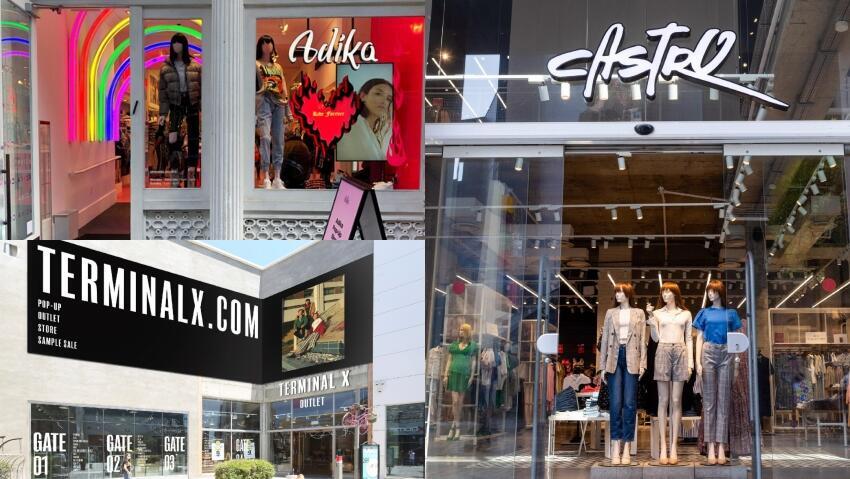Getting your Trinity Audio player ready...
For many Israeli brands, the allure of international success is akin to the ultimate runway show, where the audience is global and the possibilities boundless. Yet, recently, the dream has proven elusive. Just last week, three Israeli companies announced they were halting their overseas ventures: Terminal X is closing its Greek e-commerce site, Max Stock is reconsidering its presence in Portugal after shuttering its Porto store, and Madlan, a real estate search platform, ended its U.S. operations after investing $70 million.
Before these announcements, other Israeli companies also tried to make their mark globally, only to stumble. Adika, the trailblazer of Israeli online fashion, wound down its U.S. site, leading to a financial downturn. Carolina Lemke, the eyewear brand that has been a shining star in the Castro-Hoodies group, believed it would conquer America, even enlisting Kim Kardashian as a brand ambassador. Yet, even with Kardashian's star power, the venture faltered, resulting in a withdrawal after incurring a loss of $16.4 million.
A decade ago, Castro opened stores in Germany, Switzerland, and Russia, only to close them after losing over $17 million. They're not alone—Crazy Line attempted to enter Germany but had to retreat after realizing their stores were losing money.
So, does this mean the dream of expanding abroad with an Israeli brand is more complex than it seems, perhaps even unattainable? Can a foreign market be re-educated? Even initial successes can turn out less glamorous when the numbers are scrutinized over time, as illustrated by Strauss. The company tried to introduce hummus to Americans, but it was recently reported that they're re-evaluating their partnership in the venture. A source close to the company shared, "Strauss couldn't convince Americans that hummus is a daily spread, from sandwiches to dinner dips—they still see it as a festive specialty."
What's behind these international setbacks? The reasons are varied. Max Stock, for example, is under the control of the international investment fund Apax. Led by Zehavit Cohen, Apax Israel worked with global consulting firms to evaluate worldwide investments, surely conducting thorough market research before choosing Portugal. Ori Max, founder and CEO, noted before the move, "We identified that competition in the Portuguese stock sector is lower than in other European countries and that the Portuguese audience is aligned with the stock and discount shopping experience." Max Stock estimated the Portuguese market's potential at about 12 billion euros. Less than a year later, in the second quarter financial report, they announced they might abandon or sell the operation (two stores) due to company performance and market conditions, including new competitors entering the Portuguese market.
The Greeks weren't thrilled
At Terminal X, Harel Wiesel, the controlling stakeholder of the Fox group and a seasoned international retailer, partnered in the venture. Known for running Nike concept stores globally, Terminal X's entry into Greece was based on perceived similarities to Israel and the promise of fast delivery—basically overnight, unlike the longer shipping times of competing international sites. However, the Greeks weren't as enthusiastic as expected, leading to the operation's closure. The company reported that "setup, sales, and marketing costs exceeded expectations and weighed on Terminal's results." Two years ago, during Terminal X's IPO on the Tel Aviv Stock Exchange, the Greek market was presented as a growth engine and a gateway to international expansion. Industry experts believe Wiesel decided to quickly retreat in light of poor results in Greece and bleak economic forecasts, avoiding further investments that might take longer to yield profits.
Among the few retailers who succeeded with an Israeli format abroad is Super-Pharm, which established a thriving network in Poland. However, attempts to replicate this success in China failed, and Super-Pharm parted ways with the Chinese network they had set up.
Madlan, an Israeli real estate sales platform providing extensive information about properties and their surroundings, decided a few years ago to replicate the format under the name "Localize" in New York. However, Americans remained loyal to their sites, primarily ZILLOW. The format was changed to a platform offering tools for real estate agents to communicate with potential clients and provide property information for sale. The site accumulated losses, and Madlan attributed the closure to the state of the American real estate market. In a statement last week, they said, "Macroeconomic factors, notably interest rates and regulatory changes, are creating a deep crisis in the U.S. real estate market. For this reason, we have painfully decided that this is the right time to close."
Is a cultural gap the underlying issue?
Dr. Gila Oren, a marketing specialist, points to cultural gaps as the main reason for failure. "The assumption that Portugal and Greece are similar to us proved to be mistaken. There is likely a cultural gap that wasn't bridged. Peter Drucker, a guru in his field, said, 'Culture eats strategy for breakfast.' Companies repeatedly fail to transition themselves abroad due to cultural reasons. Additionally, there's the issue of resources: Do I have deep enough pockets, which Israeli companies don't always have? And of course, understanding the competitive landscape at the destination is crucial."
Another important issue, she says, is the brand and image. "For example, here you say Fox, you say Israel. Abroad, no one cares. There are hardly any Israeli retail systems that work directly with the end consumer (rather than just exporting their products) that have succeeded abroad."
No two winters are alike
A good example of the gaps between Israel and foreign markets was provided by Castro, which explained in hindsight that one reason for failure in Germany was the seasonal differences between Israel and Europe. In Israel, there's more summer than winter, and the Israeli seasonal collection did not match the timing or intensity of the European winter. In Israel, even the fall and spring seasons barely exist.
Dr. Michaela Elram, a marketing expert and head of the master's program in business administration at the Academic Center for Law and Business in Ramat Gan, emphasizes the global supply chain problem, which complicates and increases the cost of shipping from Israel. "Supply chain management is a skill that not everyone going abroad may have considered. And when you already make the step, you suddenly discover that it is more expensive and complicated than you thought. Additionally, as a country, we are identified with high-tech. When they say Israeli fashion abroad, it's not certain anyone will applaud us. A global customer wants to be associated with leading brands. Also, the need to learn consumer behavior at the destination is crucial: the large Primark network said it took a lot of time to crack the American market because American culture and consumer habits are very different from British ones, among other things in store size, display style, colors, and more."
Tamir Ben Shahar from the consulting firm Czamanski Ben Shahar explains that "One of the problems in breaking into foreign markets is the lack of familiarity with the market. The thinking that my product or concept is unique is not enough if I don't know the consumer behavior at the destination. If you really want to know the destination's habits well, you need to live there for at least a few months. Moreover, retail is a process that requires a lot of time to succeed. Israelis are impatient, and if there are no results in a year or two, they shut it down. Establishing and opening a new market takes a while and requires long-term investments. If you didn't consider this in the business plan, you're in trouble."




